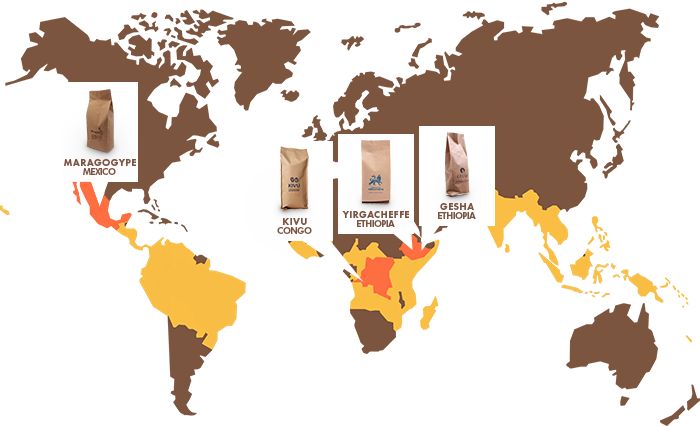Single origin (speciality) coffee beans – what does that actually mean?


What does “single origin” mean?
“Single origin“ literally means “one origin”. The term is also known as “speciality coffee”. Generally, it’s coffee from one harvest and one species, which came from one specific farm in a particular region. Usually this information is displayed on the packaging, but it’s never the most detailed description.
What makes “single origin” coffee different?
The most important aspect of speciality coffee: traceability, or the possibility of knowing exactly where your coffee came from. Coffee lovers particularly love speciality coffees, because it allows to experience local flavours – how nature and air in particular region shaped coffee trees and formed the flavour of coffee beans, what taste profile dominates in a small, particular part of the world.
Why is it worth trying speciality coffee?
Probably the most important reasons why you should try “single origin” coffee beans: knowledge and experience. When tasting coffee from a particular region you will get a good idea of flavours and aftertastes that dominate in the region, and you will be able to decide if you like it or not. This knowledge will make it so much easier when looking for new flavours and trying to find “the one”—your favourite coffee. Also, who knows? Maybe coffee from specialty beans will become Your Favourite One.
Exclusive, solid, rich taste
Unlike a cup of coffee from a coffee bean blend, speciality coffee is very different when compared amongst each other. It’s very hard to confuse coffee from different regions. Let’s say Mexican “Maragogype” coffee beans will have hints of caramel sweetness, fresh herbs and spices, while Ethiopian “Gesha” beans will have notes of different fruits and berries: blueberries, prunes and apples.

Let’s say a mix consists of 5-6 different types of coffee beans. Natural disasters, droughts or heavy rains and other natural aspects will have much less impact on the overall taste (and price), because one kind of bean will make up only one little part of the mix. If one our of many regions will have a bad harvest due to worsening natural conditions, you’re not very likely to feel any difference in the blend—beans from one region will compensate for lack of taste by beans from other region, so the taste qualities in the whole blend remain alike and price doesn’t change that much. Speciality coffee has very rich taste qualities (that’s what excites gourmet coffee lovers), but when you love a specific type of coffee, you can never be sure if you will be able to get it next season or what the price will be. If the next harvest is much smaller, the price goes up and you might not even get your favourite coffee, because demand exceeds supply. There are even people, so called “coffee hunters”, who travel the whole world specifically looking for speciality coffee, buy it in low amounts and then sell it for a much higher price. Some speciality coffee types are even compared to gold. That’s why it’s worth it to try them.
| Single origin coffee | Blends |
| Beans come from one specific place (country or region) | Beans come from different regions |
| Unique flavour, which you can not confuse with beans from any other region | The flavour of one blend does not really change in time, less impact of different natural conditions in the region |
| Best taste when drinking without milk | Good for enjoying a cup of plain black coffee or coffee drinks with milk |
| Usually light or medium roasted to keep the natural flavours | Different levels of roasting, usually medium or dark roast. |
| Usually used to prepare espresso or drinks with different preparation methods: Pour-over, Syphon and Chemex | More suitable for preparation with coffee machines, but less often with other methods |
What’s better? Speciality coffee or blends?
There is no single answer to this. From one side, blends basically don’t change the flavour through time. If you really fell in love with a specific blend, you can be sure that your favourite blend will keep all the qualities and flavour, despite the factors that affect coffee plantations. Yet blends don’t have very rich flavours; prepared drink will be kind of “in the middle”. Meanwhile single origin coffee beans will have a rich flavour from that specific region, so when you prepare a drink, you’ll be able to detect a particular, rich and solid flavour, characterized for a specific region (e.g.,
Central America – brown sugar and cacao; Kenya – sweet, fruity aftertaste). But speciality coffee’s taste qualities can vary depending on the climate conditions throughout the year. However, speciality coffee will always bring the joy of discovering a new, specific flavour.
